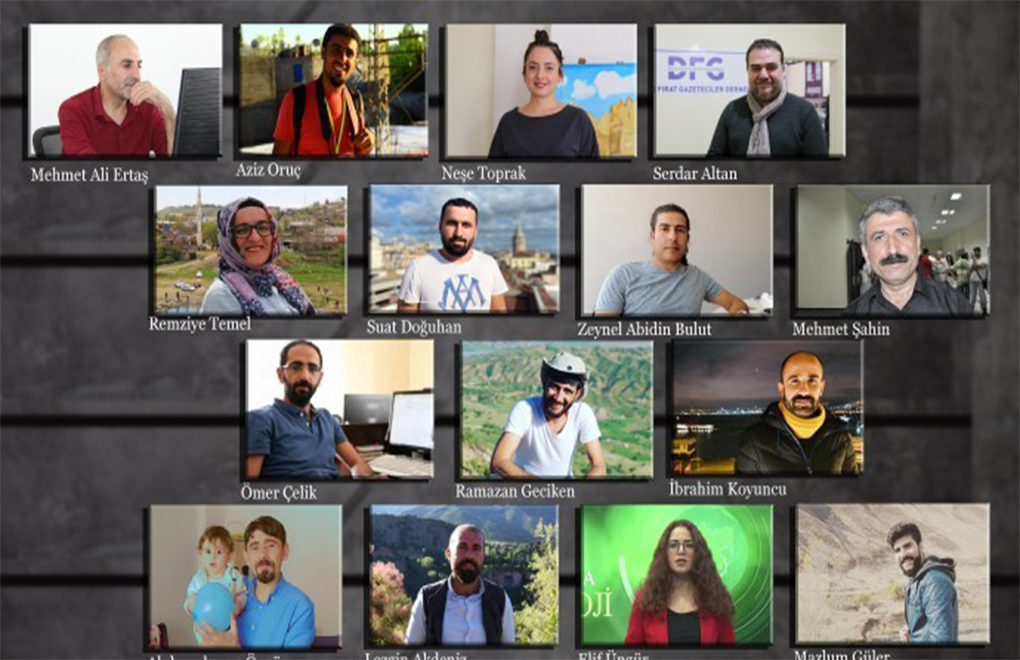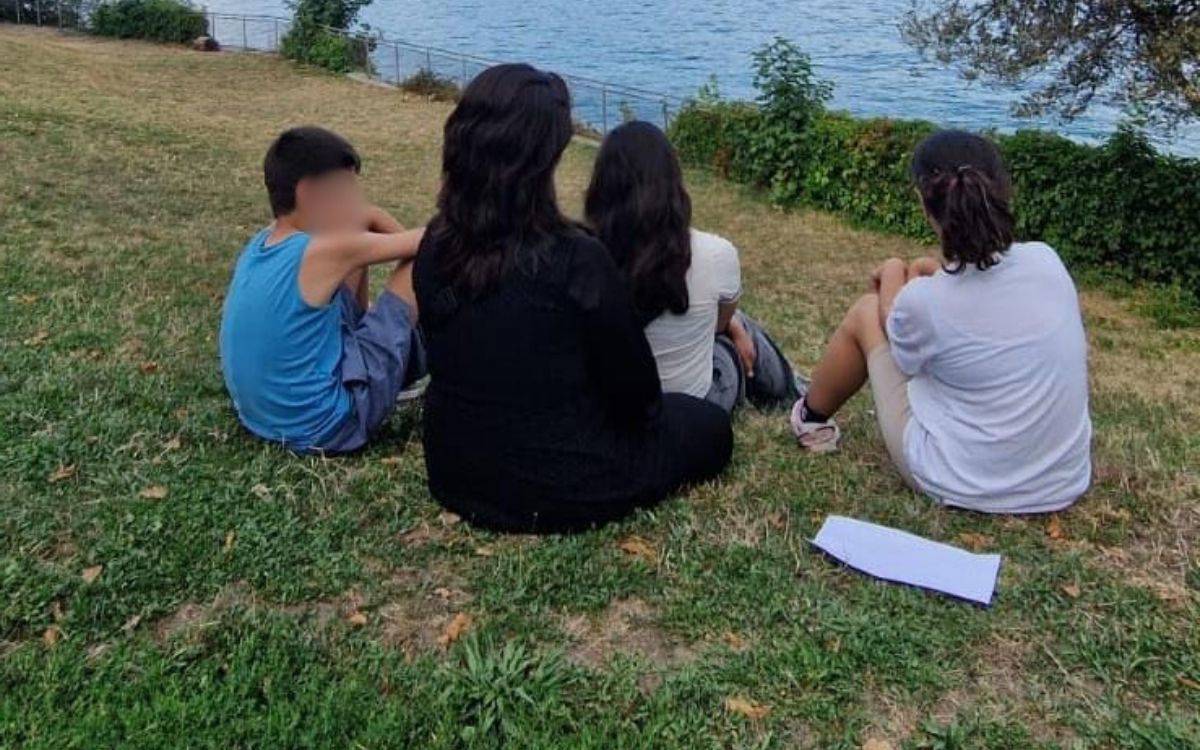Click to read the article in Turkish / Kurdish
The first hearing of the case in which 18 journalists are standing trial, 15 of whom are imprisoned, started to be heard at the Diyarbakır 4th Heavy Penal Court.
Imprisoned journalists Ömer Çelik, Mehmet Ali Ertaş, Serdar Altan, Mehmet Şahin, and Zeynel Abidin Bulut took the floor in the hearing today, all of them in Kurdish and asserted that it was the Kurdish press, Kurdish journalism, or the media where the Kurdish problem is discussed that is being charged in this case.
As the first thing, the lawyer of the journalists, Resul Temur, told that the prosecutor who prepared the indictment for the case file, and a member of the panel of judges were married, and demanded recusation. The chief judge refused the demand.
The chief judge stated that no use of computers or cell phones will be allowed in the courtroom, and the journalists who are present at the hearing were heard to object.
Serdar Altan: "We were the voice of the oppressed"
After the summary of the indictment was read out, Serdar Altan, one of the imprisoned journalists and the co-chairperson of the Dicle Fırat Journalists Association, defended himself in the court in Kurdish.
Taking the floor for one hour and 45 minutes, Altan told about the pressure against the press from the Ottoman period until today. Reminding Hasan Fehmi, killed on April 6, 1909, he said that journalists were always under threat in this region.
"Those who did not approve of the Kurds and the Kurdish press in those days, do not accept it today either," he said.
"This is no ordinary operation"
Altan underlined that they were detained on June 8, 2022, and later remanded in custody. He went on to say that he and his friends were unjustly detained while making preparations for commemorating their journalist friend Hafız Akdemir, killed by Hizbullah on June 8, 1992.
"The fact that we have been taken into custody on the day our friend was killed shows that this operation is a special one. This is not an ordinary operation. They have assigned a special prosecutor. Our detention period was extended to 8 days. A confidentiality order was imposed on the case file. The police came to and did not leave the institutions where we work for one month. Journalism tools and materials that all journalists use were regarded as elements of crime," Altan explained.
"The indictment is not worth responding to"
Altan also stated that no one told them about the charges against them. This is a major problem and a punishment by itself, he argued.
Now that the indictment was finally prepared after so long, he said it was not even worth responding to.
"They are making fun of us. They are trying to create confusion. What is in the indictment? There is no crime, there is no evidence. They kept us here for 10 months and searched for evidence so that they can blame us. They could not find it during our detention, then they found an anonymous witness," Altan said.
He told the hearing that they requested the anonymous witness to be brought to the court, which was rejected. Personally, I am charged with being a member of an organization, but there is no evidence," he said.
"We came to the court not to give an account, but to call you to account. Why have you kept us away from our beloved, from the streets, from our occupation for 13 months?" Altan said.
There was a break in the hearing after Altan completed his defense. Journalism organizations and Green Left Party (YSP) and Republican People's Party (CHP) MPs gave statements to the press in front of the courthouse during the break.
Çelik: Is broadcasting a program a crime?
Imprisoned journalist Ömer Çelik took the floor after the break and defended himself in Kurdish.
He stated that they do not accept the accusations. "I want to talk about what the indictment includes. Is broadcasting a program a crime? The prosecutor has pointed to the term "ethnic." All the six programs mentioned in the indictment are related to discussions on the Kurdish problem."
"Broadcasting in our native tongue is a crime according to the prosecutor. However, this is a global right. Asking a question about a sentence that [Recep Tayyip] Erdoğan has used for Abdullah Öcalan, to Ömer Öcalan, an MP of the People's Democratic Party (HDP) is shown as a crime. This MP is still serving in the parliament, how can this question be a crime? I have made many programs but six of them have been included in the accusations. Many of them cover the issues discussed throughout Turkey. It is a program that many politicians in Turkey have attended. How can it be criminal?"
"The prosecutor is claiming that I was instructed to ask these questions, but without any concrete evidence. The prosecutor is making claims but cannot prove them. There is no single evidence that we are being instructed."
"The government does not want the Kurdish problem to be discussed"
"As a journalist, I prepare my programs myself. Both the content and the presentation. The prosecutor is disturbed that I talk about the issues related to the problems of the Kurdish people with my guests in my program. The government does not want the Kurdish problem to be discussed."
After Çelik, Zeynel Abidin Bulut took the floor and defended himself again in Kurdish.
Bulut underlined that if it was not for this journalism activity, for the Kurdish journalists, none of the massacres such as that of Ceylan Önkol, Uğur Kaymaz, or Roboski would be known. These were all proven by the Kurdish journalists Bulut told the court and said that this was what was disturbing the government and the state.
The only newspaper in Kurdish standing trial
Next, Mehmet Ali Ertaş also defended himself in Kurdish.
"We are here today because of our programs in Kurdish. There is a single printed newspaper in Kurdish and it is standing trial here today. This means that it is the values of the Kurdish people that are standing trial here. We are being told that we cannot defend the values of our people," Ertaş said.
The last one to address the hearing today was journalist Mehmet Şahin. In his defense made in Kurdish, he said, "Today I am here with my mother's language."
Telling that his profession as a teacher that he carried out for 26 years, was taken away from him after the attempted coup of July 15 in 2016, and it was after this that he became a journalist. "Kurdish journalists are suffering oppression as usual. The prosecution has taken on the task of eliminating Kurdish journalism," Şahin said.
The chief judge closed the hearing after listening to Şahin, in order to continue it tomorrow (on July 12).
Organizations of journalists were present in the hearing
Reporters Without Borders (RSF) Turkey representative Erol Önderoğlu, Turkey Journalists Union (TGS) Chairperson Gökhan Durmuş, DİSK Basın-İş Union Ankara Representative Turgut Dedeoğlu, Media and Law Studies Co-Director lawyer Veysel Ok, Engin Deniz İpek from IPI, Caroline Stockford from PEN Norway Turkey desk, Dicle Fırat Journalists Association (DFG), Mezopotamia Women Journalists Platform (MKGP), Progressive Journalists Association (ÇGD), Committee for Protection of Journalists (CPJ), lawyer members of Amsterdam Law Clinics, Diyarbakır Bar, Free Lawyers Association (ÖHD), Human Rights Association (İHD) were present in the hearing. Green Left Party Diyarbakır MPs Cengiz Çandar, Adalet Kaya and Republican People's Party (CHP) Diyarbakır MP Sezgin Tanrıkulu and Utku Çakırözer were also among those who participated in order to observe the hearing.






.jpg)
.jpg)




